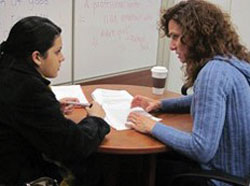Monmouth University has never been short of resources for Hawks to utilize.
Freshman orientation is usually when students hear about the variety of campus resources we have as a University including but not limited to the Math Learning Center, the entire Center for Student Success and even things as simple as professor office hours. Taking into consideration all majors and minors, there is one piece that should be highlighted is the Writing Center.
From criminal justice to business and accounting all the way back to English majors themselves use the Writing Center to not only helps their writing within that moment but also for tips on what to do for future assignments. Vincent DeVita, a senior accounting and real estate student said that “Even as a business-based major, it’s important to be able to write not only grammatically correct but also to be able to portray your thoughts cohesively for your reader to understand. Being able to use the Writing Center as an added resource comes in handy pretty often.”
What is especially unique about the Writing Center is that they have a select staff of student employees that assist in appointments; Michael Fazzino, a freshman communication student feels that “Being helped by a fellow student actually makes the service easier in my opinion. When being helped by a professor sometimes a student feels that they have to act a certain way and do their work perfectly because a professor is there helping. When it’s another student there’s more of a connection between two students and an easier line of communication when working.” Though he has yet to use the Writing Center this semester, Fazzino says that he will be using it in the future.
When working one-on-one with your peers, the appointment gives students the opportunity to voice their questions in a more connected environment. Madison Hlavach, a junior English and education student who works for the Writing Center, said, “For me, I do not find it awkward to help my fellow peers with writing papers. I think in order to be a teacher; you simply must be willing to teach. While it can be uncomfortable addressing problems with fellow peers at times regarding their papers, I think we all need constructive criticism to grow at anything we do.”
 Hlavach has a point in the sense that if we need to write papers or outlines to simply get a good grade or if it is something that is going to be a part of our career, it’s important to be good at it and to practice at it. But, some students have had different experiences with student-to-student interaction, Anne Doyle a junior English and education student, said, “From my one experience I was very uncomfortable with the fact that I was with a fellow student. I was having trouble with grammar and the use of comma splices. Instead of helping me and teaching me how to properly use commas and grammar tenses– the student took my computer and fixed everything for me.” Doyle added that the fact that professors are able to be notified that you go to the center is that of great importance, “I think it shows your professors that you care and that you are trying.”
Hlavach has a point in the sense that if we need to write papers or outlines to simply get a good grade or if it is something that is going to be a part of our career, it’s important to be good at it and to practice at it. But, some students have had different experiences with student-to-student interaction, Anne Doyle a junior English and education student, said, “From my one experience I was very uncomfortable with the fact that I was with a fellow student. I was having trouble with grammar and the use of comma splices. Instead of helping me and teaching me how to properly use commas and grammar tenses– the student took my computer and fixed everything for me.” Doyle added that the fact that professors are able to be notified that you go to the center is that of great importance, “I think it shows your professors that you care and that you are trying.”
Every student and session is completely different based on the needs of each. Hlavach said, “The sessions go according to what the student is most interested on focusing on. Once we sit down together, I immediately ask them what we are working on, what their prompt is, and what they are most concerned with regarding their paper. This then leads us in the direction of what we are addressing whether it be grammar, formatting of MLA or APA, or making sure the paper simply makes sense as a whole.”
 As students, we tend to get off track with papers when we are really knoweldgeable about a topic. We begin to ramble to the point where the thesis of our paper is not relevant to our topic or conclusion. A trick to help with this innate need to ramble continuously is to make an outline to help you stay focused and stay on task with your thesis while still giving yourself a chance to express that idea thoroughly.
As students, we tend to get off track with papers when we are really knoweldgeable about a topic. We begin to ramble to the point where the thesis of our paper is not relevant to our topic or conclusion. A trick to help with this innate need to ramble continuously is to make an outline to help you stay focused and stay on task with your thesis while still giving yourself a chance to express that idea thoroughly.
It isn’t uncommon for professors to enforce or even require students to make use of the Writing Center. Dr. John Comiskey, EdD, a professor of homeland security said, “Whether you are a police officer writing reports or whether you’re an attorney writing reports you write all the time and you read all the time. When you’re writing, you are thinking at a higher level…it promotes something called cognitive angst. Critical writing especially, is writing for the reader.”
While there is an abundance of different resources for Hawks to use, it is evident that the Writing Center has always been a staple for students to take advantage of whether they are an education student, accounting major, or any other major for that matter, the Writing Center has more to offer than just help with your English courses.
The Writing Center is located on the basement floor of the Rebecca Stafford Student Center within the Center for Student Success.
IMAGE TAKEN from www.monmouth.edu
IMAGE TAKEN from www.monmouth.edu




